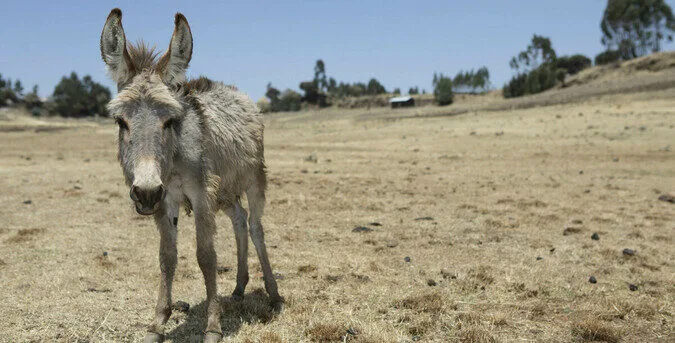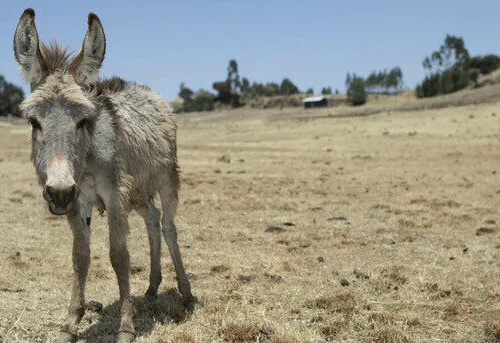What’s the difference between a mule and a donkey?
- Size: You can usually distinguish between a mule and a donkey by its size. Thanks to those horse genes, a mule is considerably larger than most donkeys!
- Ears: Both equids have the charming ears of donkeys; however, mules have lighter fur on their ears and their ears often have a more ‘horse-like’ shape.
- Body shape: Mules have that slightly curved back that you’ll see on a horse, whereas donkeys’ backs are flatter.
- Markings: Mules don’t always have the distinctive dorsal stripe that we would usually see on donkeys. This is a primitive marking shaped like a cross that covers the length of a donkey’s back.
- Colour: Donkeys are most often a shade of grey or black, but mules can be any colour variation.
- Tails: Mules generally have flowing tails like their horse mothers, whereas donkeys tend to have a shorter tuft of hair at the tip of their tails.
How long do mules live for?
Mules can live up to 50 years, significantly longer than a horse’s 25-30 years. There is some speculation as to why this might be, namely that crossbreeds are sturdier and healthier. However, the lifespan of a working mule is often affected by overwork, poor diet, and unsatisfactory living conditions.
How Big Are Mules?
The size of a mule can vary greatly, just like the sizes of horses and donkeys. Generally, they measure between 12 to 17.5 hands and weigh between 80-480 kg.
Can mules reproduce?
A mule is a hybrid of a male donkey and a female horse, and therefore cannot produce viable offspring.
Horses have 64 chromosomes and donkeys have 62; mules inherit 63 of these (32 from the horse and 31 from the donkey). Due to the uneven number of chromosomes, mules cannot mate with other mules and produce offspring. In other words, two mules don’t make a mule! However, there have been rare occasions of offspring produced from mating with a male horse or donkey.
What do Mules Eat?
Mules love fruit and vegetables as a special treat, but their main diet should be comprised of grass and grains. Mules are much more efficient with their nutrition intake than horses. Even at roughly the same size, they’re able to sustain themselves on much less, making them resilient in tough environments.
Where do mules originate from?
Throughout history, mules have been bred to carry out labour for all kinds of communities. The first records of mule breeding date back to ancient regions of Paphlagonia and Nicaea, now modern-day Turkey. According to The American Mule Museum, The Hittites of Bronze Age, West Asia considered mules to be at least three times more valuable than even the strongest and fastest chariot horse. Additionally, the people of ancient Ethiopia gave mules the highest status over any other animal.
What is a Hinny?
A Hinny is a hybrid of a female donkey and a male horse. They are less common than your average mule with a few distinct differences. They are shorter and often have lighter heads, shorter ears and tasselled tails similar to a donkey. They are typically raised by donkeys meaning they display more donkey-like behaviours.
At SPANA, much of our work is aimed at transforming their welfare through veterinary care and the education and training of owners. Over the years, we have helped thousands of working mules have a better life. Help us reach more mules in desperate need by donating to support them today.
If you’d like to learn more about this humble superhero of the animal kingdom, check out 13 things you didn’t know about mules.


